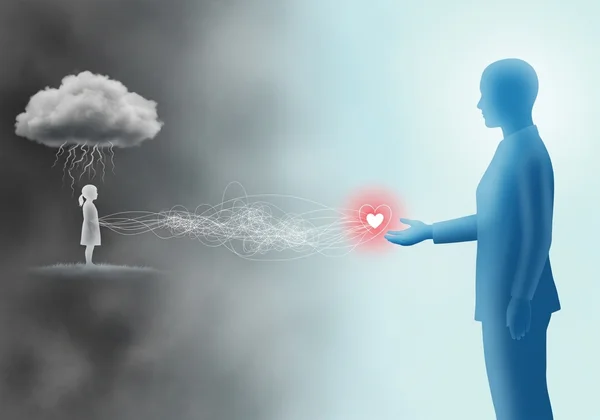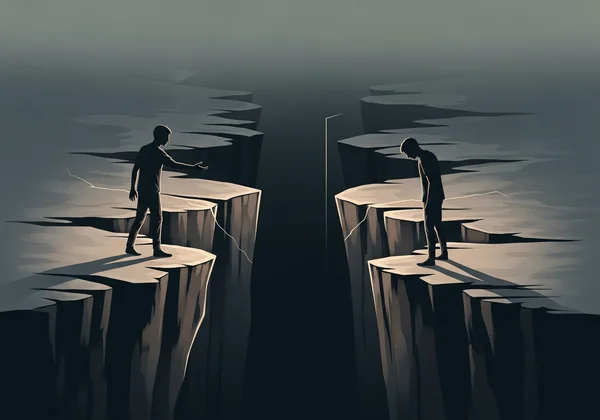Come il test ACE influenza le relazioni: Comprendere il tuo punteggio ACE
August 26, 2025 | By Jasper Quinn
Ti senti mai bloccato in un ciclo, ripetendo gli stessi schemi dolorosi nelle tue relazioni? Fai fatica a fidarti profondamente, trovi l'intimità impegnativa o navighi costantemente nel conflitto? Non sei solo, e la chiave per comprendere questi schemi potrebbe risiedere nel tuo passato. Questa guida esplora il potente legame tra il test ACE e le tue relazioni adulte, offrendo un percorso compassionevole verso la costruzione delle connessioni sicure e amorevoli che meriti. Cosa significa il mio punteggio ACE per la mia capacità di connettermi con gli altri? È una domanda che racchiude la promessa di una profonda consapevolezza di sé.
Comprendere la tua storia è il primo passo per riscrivere il tuo futuro. Puoi iniziare questo viaggio di scoperta facendo un test ACE gratuito e confidenziale per ottenere informazioni sulla tua storia personale. Questo semplice strumento fornisce una base per comprendere come le tue esperienze infantili possano influenzare la tua vita oggi.
Come il Trauma Infantile e le Relazioni Sono Collegati
Il legame tra i nostri primi anni di vita e le nostre relazioni adulte non è solo un'idea vaga; è un campo di studio radicato nella psicologia e nelle neuroscienze. Le Esperienze Avverse nell'Infanzia (ACE) sono eventi stressanti o traumatici che possono alterare fondamentalmente il nostro percorso di sviluppo. Queste esperienze non svaniscono; diventano parte del nostro modello interno di come funziona il mondo e di come dovremmo gestire le nostre connessioni con gli altri. Il legame è profondo, influenzando tutto, da chi ci attrae a come gestiamo i disaccordi con un partner.

Il Ruolo degli Stili di Attaccamento nei Tuoi Legami Adulti
Le nostre prime relazioni, tipicamente con i genitori o i principali caregiver, ci insegnano cosa aspettarci dagli altri. Questo forma il nostro stile di attaccamento, un quadro di riferimento per l'intimità e la connessione emotiva. Quando l'ambiente di un bambino è sicuro e responsivo, tende a sviluppare uno stile di attaccamento sicuro. Tuttavia, le infanzie segnate dalle ACE spesso portano a schemi di attaccamento insicuri—ansioso, evitante o disorganizzato—che persistono nell'età adulta, creando sfide nella formazione di legami stabili e soddisfacenti.
Come un Punteggio ACE Elevato Modella il Tuo Cervello e il Sistema Nervoso
L'esposizione prolungata alle avversità nell'infanzia può portare a quella che è conosciuta come una risposta allo stress tossico. Questo altera letteralmente il cervello in via di sviluppo e rende più reattivo il sistema nervoso. Da adulto, ciò può manifestarsi come uno stato costante di "lotta, fuga o congelamento". In una relazione, potrebbe apparire come una reazione eccessiva a problemi minori, il chiudersi durante le discussioni o una persistente sensazione di ansia che il partner possa andarsene. Comprendere questo impatto biologico è una parte fondamentale dell'interpretazione del test del punteggio ACE.
Problemi Comuni di Fiducia e Intimità
Se il tuo ambiente precoce era imprevedibile o insicuro, imparare a fidarsi degli altri può sembrare un compito impossibile. Le ACE spesso lasciano dietro di sé una convinzione profonda che le persone alla fine ti feriranno o ti abbandoneranno. Questo può creare significativi problemi di fiducia e una paura della vulnerabilità, rendendo la vera intimità emotiva un ostacolo importante. Potresti tenere i partner a distanza o sabotare le relazioni non appena diventano serie, tutto come un modo per proteggerti dal rivivere il dolore passato.
5 Schemi Relazionali Comuni Causati dalle ACE
Riconoscere questi schemi non è una questione di colpa; è una questione di consapevolezza. Quando possiamo nominare ciò che sta accadendo, riacquistiamo il nostro potere di cambiarlo. Molte persone che fanno un test ACE online iniziano a riconoscere i propri comportamenti in queste dinamiche comuni.

Schema 1: La Paura dell'Abbandono
Una profonda e spesso subconscia paura dell'abbandono può guidare molti comportamenti relazionali. Questo potrebbe portarti a essere eccessivamente compiacente, ignorando i tuoi bisogni per mantenere felice il partner. Al contrario, può anche portare ad allontanare le persone per prime per evitare il dolore di essere lasciato. Questa paura radicata spesso deriva dall'aver sperimentato negligenza o la perdita di un caregiver nell'infanzia.
Schema 2: Difficoltà a Stabilire Confini Sani
Se il tuo spazio personale o le tue esigenze emotive non sono state rispettate da bambino, potresti non aver mai imparato a creare e mantenere confini sani. Nelle relazioni adulte, questo può portare a un invischiamento, in cui si perde il proprio senso di sé, o a sentirsi costantemente dato per scontato. Stabilire confini non significa allontanare le persone; significa creare uno spazio sicuro affinché una connessione sana possa prosperare.
Schema 3: Una Tendenza all'Evitamento o alla Creazione di Conflitti
A seconda del tuo ambiente infantile, potresti aver imparato che il conflitto è pericoloso e dovrebbe essere evitato a tutti i costi (evitamento del conflitto). Ciò porta a risentimenti irrisolti che lentamente erodono una relazione. D'altra parte, potresti essere cresciuto in una casa caotica dove creare conflitto era un modo per avere un senso di controllo o ottenere attenzione, uno schema che può essere incredibilmente destabilizzante in una relazione adulta.
Schema 4: Scegliere Partner Inadatti o Emotivamente Non Disponibili
Siamo spesso attratti da ciò che è familiare, anche se è doloroso. Se hai sperimentato negligenza emotiva o incoerenza da bambino, potresti ritrovarti ripetutamente attratto da partner emotivamente non disponibili. Questo schema subconscio è un tentativo di riparare la ferita originale, ma spesso porta a un ciclo di delusione e rafforza la convinzione di non essere degno d'amore.
Schema 5: Perdere il Proprio Senso di Sé in una Relazione
Per molti sopravvissuti a traumi infantili, l'autostima si intreccia profondamente con l'approvazione del partner. Questo può portare a perdere completamente la propria identità, hobby e amicizie nel tentativo di fondersi con il partner. Questa mancanza di un solido senso di sé rende le relazioni fragili, poiché l'intero mondo emotivo dipende dalla stabilità di un'altra persona.
Un Percorso in Avanti: Passi Azionabili per Guarire le Relazioni
Il messaggio più incoraggiante dello studio ACE è questo: il tuo punteggio non è il tuo destino. È uno strumento di comprensione che porta con sé il potere di guarire. Costruire relazioni più sane è un viaggio di sforzo consapevole e auto-compassione. Il processo inizia con un singolo passo: ottenere chiarezza sul tuo passato facendo il test ACE sui traumi infantili.

Inizia con la Consapevolezza: Comprendi i Tuoi Fattori Scatenanti
Il primo e più critico passo è l'auto-consapevolezza. Comprendendo come le tue esperienze passate si manifestano nel presente, puoi iniziare a identificare i tuoi fattori scatenanti emotivi. Quando sai quali situazioni o commenti riaprono vecchie ferite, puoi imparare a fare una pausa e rispondere in modo ponderato invece di reagire da un luogo di paura o dolore. Questa consapevolezza è il dono che la conoscenza del tuo punteggio ACE fornisce.
Sviluppa Abilità di Comunicazione Sicure
Molti problemi relazionali derivano da una comunicazione inefficace o insicura di bisogni e sentimenti. La guarigione implica l'apprendimento di nuove abilità. Esercitati a esprimerti usando frasi con "io" (ad esempio, "Mi sento ferito quando...") invece di frasi accusatorie con "tu". Imparare ad ascoltare attivamente e a convalidare i sentimenti del tuo partner, anche quando non sei d'accordo, può trasformare una dinamica ricca di conflitti in una partnership collaborativa.
Perché Cercare Supporto Professionale Può Aiutare
Mentre l'auto-consapevolezza è potente, la guarigione da traumi profondamente radicati spesso richiede una guida. Un terapeuta specializzato in traumi può fornire uno spazio sicuro per elaborare le tue esperienze e sviluppare nuove strategie di coping. Cercare supporto professionale è un segno di immensa forza e impegno per il tuo benessere. Discutere il tuo punteggio ACE con un professionista può essere un eccellente punto di partenza per il percorso terapeutico.
Il Tuo Punteggio è un Punto di Partenza, Non una Condanna
Il tuo passato ti ha plasmato, ma non deve dettare il tuo futuro. Comprendendo la tua storia, riacquisti il potere di scrivere un nuovo capitolo—uno pieno delle connessioni sicure e amorevoli che meriti. Se sei pronto a fare quel primo coraggioso passo, il nostro test ACE gratuito e confidenziale è qui per aiutarti a iniziare il viaggio.
Domande Comuni su ACE e Relazioni
In che modo un punteggio ACE influisce direttamente sugli stili di attaccamento?
Un punteggio ACE quantifica le avversità infantili, che è un fattore primario nello sviluppo degli stili di attaccamento. Un punteggio ACE elevato spesso si correla con ambienti in cui i bisogni di sicurezza, coerenza e connessione emotiva di un bambino non sono stati soddisfatti. Questo può portare a un attaccamento insicuro (ansioso, evitante o disorganizzato) mentre il bambino si adatta a sopravvivere in un ambiente imprevedibile. Comprendere il tuo punteggio attraverso un quiz sul trauma infantile può offrire indizi cruciali sulle radici dei tuoi schemi di attaccamento.
Si può avere una relazione sana con un punteggio ACE elevato?
Assolutamente. Avere un punteggio ACE elevato non è una condanna a vita per relazioni malsane. Significa semplicemente che potrebbe essere necessario un maggiore lavoro interiore per superare gli schemi di sopravvivenza appresi nell'infanzia. Con l'auto-consapevolezza, l'impegno nella guarigione e lo sviluppo di nuove abilità emotive e comunicative, gli individui con punteggi ACE elevati possono e costruiscono partnership incredibilmente sicure, amorevoli e resilienti.
Come si presenta la guarigione dal trauma infantile nelle relazioni?
Guarire dal trauma infantile è un processo, non una destinazione. Nel contesto delle relazioni, si presenta come imparare a regolare il proprio sistema nervoso per rimanere presenti durante i conflitti. Implica costruire la fiducia in sé stessi e imparare a stabilire confini fermi e rispettosi. Significa anche scegliere partner che supportano il tuo percorso di guarigione ed essere in grado di offrire la stessa grazia in cambio. Il viaggio spesso inizia con un semplice atto di auto-esplorazione, come decidere di comprendere il tuo punteggio.